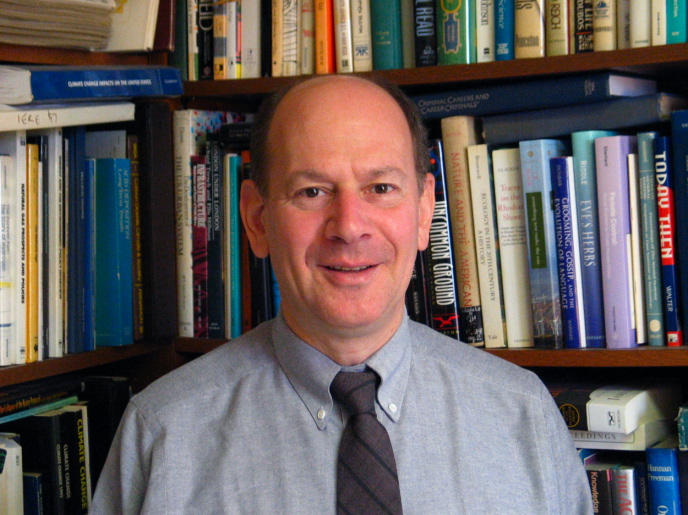Director
Program for the Human Environment
The Rockefeller University
1230 York Ave, Box 234
New York, NY, 10021
Phone: (212) 327-7917, Fax: (212) 327-7519
Email: ausubel@mail.rockefeller.edu
https://phe.rockefeller.edu/jesse/
Publications, in chronological order
Publications, by topic (includes committee reports drafted, books supervised, and informal works of humor, drama)
Jesse H. Ausubel is Director of the Program for the Human Environment and Senior Research Associate at The Rockefeller University in New York City. The program aims to elaborate the vision of a large, prosperous society that emits little or nothing harmful and spares large amounts of land and sea for nature. The work spans forests and farms, marine life, human population, energy and materials, and climate as well as life, earth, and engineering sciences. Underlying the work are studies of the mathematics of growth and diffusion.
Between 1977-1988 Mr. Ausubel worked for the National Academies complex in Washington DC as a fellow of the National Academy of Sciences, staff officer of the National Research Council Board on Atmospheric Sciences and Climate, and from 1983-1988 Director of Programs for the National Academy of Engineering (NAE). Mr. Ausubel was a main organizer of the first UN World Climate Conference (Geneva, 1979), which substantially elevated the global warming issue on scientific and political agendas. During 1979-1981 he led the Climate Task of the Resources and Environment Program of the International Institute for Applied Systems Analysis, near Vienna, Austria, an East-West think-tank created by the U.S. and Soviet academies of sciences. Mr. Ausubel helped formulate the US and world climate research programs.
During 1989-1993 Mr. Ausubel served both at The Rockefeller and as Director of Studies for the Carnegie Commission on Science, Technology, and Government. The Commission, sponsored by Carnegie Corporation of New York, sought ways for the US government at all levels, as well as international organizations, to make better use of scientific and technical expertise.
Mr. Ausubel has authored and edited over 200 articles, reports, and books. He co-authored the 1989 paper “Dematerialization” that opened the study of this subject and in 1991 published the first paper explicitly on the “decarbonization” of the energy system. Mr. Ausubel was guest editor and lead author of the 1996 issue of Daedalus, “The Liberation of the Environment.” Reports for which he was main author include Changing Climate (National Academy, 1983), the first comprehensive review of the greenhouse effect, and Toward an International Geosphere-Biosphere Program (IGBP), the 1983 Research Council report originating the Global Change Program. For the NAE, he developed and oversaw studies on the performance of technology-intensive sectors of U.S. industry and on the diffusion and globalization of technology and helped conceive the field of field of industrial ecology.
Between 1994-2019 Mr. Ausubel served concurrently as a program manager and advisor for the Alfred P. Sloan Foundation. Under Sloan auspices, Mr. Ausubel helped create and complete the decade-long Census of Marine Life, an international program to assess and explain the diversity, distribution, and abundance of life in the oceans. He also co-founded the movement to develop short genetic identifiers, DNA barcodes, for animals, plants, and fungi, and served as founding chair of the Encyclopedia of Life, to develop a webpage for every species. In 2009, he helped establish the international Deep Carbon Observatory and later the International Quiet Ocean Experiment, which earned endorsements from key ocean science organizations in 2015. His group’s laboratory work at The Rockefeller University has concentrated since 2014 on surveying marine biodiversity through the loose DNA (eDNA) in sea water.
Mr. Ausubel’s interest in DNA also spans the traces found in works of art, and more generally ways that genomics, molecular biology, and microbiology can help understand and conserve cultural heritage. He helped form and now leads the Leonardo Da Vinci DNA Project to obtain and sequence the genome of Leonardo in order to understand better Leonardo’s extraordinary visual acuity and other attributes.
In the late 1990s, Mr. Ausubel managed the creation and production of the first interactive simulation model of the US university, Virtual U., and spurred development of the Serious Games movement.
Educated at Harvard and Columbia, Mr. Ausubel serves on several editorial boards, including the Journal of Industrial Ecology, and is a University Fellow of Resources for the Future and an adjunct faculty member of the Woods Hole Oceanographic Institution, where he has conducted studies since 1991.
Jesse was the recipient of the 2022 Nierenberg Prize for Science in the Public Interest.
